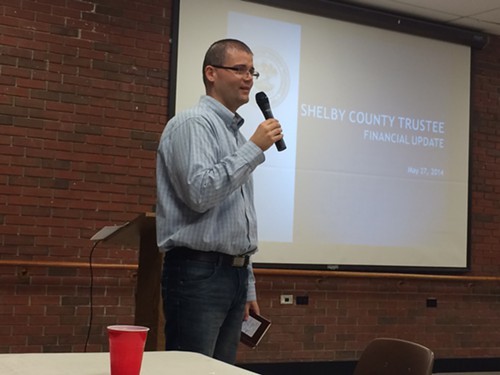
- JB
- Pablo Pereya addressing East Shelby GOP members
If there was ever doubt as to the political content of the possibly receding matter of County Commissioner Henri Brooks’ outbursts in the May 12 Commission meeting, it was surely diminished somewhat Tuesday night at this month’s regular meeting of the East Shelby Republican Club.
Although the featured speaker was County Trustee David Lenoir, who presented a rundown on the work of his office, and some general remarks were also made to club members by Shelby County Mayor Mark Luttrell, more than usual interest was paid to a brief ad hoc appearance by one Pablo Pereya.
Club program director Arnold Weiner introduced Pereya this way : “He’s the one who had a stand-down with Henri Brooks. He’s the de facto head of the Hispanic Republican Alliance.”
The “stand-down,” it will be remembered, came at the May 12 Commission meeting when Pereya was talked into addressing the Commission on a contentious roofing-contract issue by GOP members Terry Roland and Heidi Shafer (neither of whom, it should be said, appeared to have an espressly partisan motive; Shafer would say later that she had not known Pereya in advance of the meeting and was not aware of his political affiliation.).
The issue in the Commission meeting was over the fact that the successful bidder for the roofing contract employed Hispanic workers rather than African Americans and had thereby satisfied equal-opportunity mandates regarding minority employment, Brooks and fellow African-American Commissioner Walter Bailey insisted that the arrangement amounted to denial of employment for black workers.
It was then that Pereya made his appearance, waxing rhetorical about the plight of Hispanics and contending that “growing up Hispanic in Memphis is definitely [being] a minority in the minority.”
Brooks’ response, the first of several of hers that proved inflammatory that day, was to give Pereya a dressing-down: “Your experience does not compare to mine….You asked to come here. You asked to come here. We did not. And when we got here, our condition was so egregious, so barbaric. Don’t ever let that come out of your mouth again….”
Since then, members of both the Commission and of the Democratic Party, whose standard Brooks carries as a party nominee for Juvenile Court Clerk, have been in something of a pickle, isolated members of both wondering, as a storm of public criticism erupted, if some sort of remedial action should be taken against Brooks.
That initial impulse seems to have diminished, although censure was briefly discussed (in private) by Commission members. The Democratic Party’s local executive committee has met since but ignored the issue as a likely no-win situation — the idea apparently being that action against Brooks would generate divisions within the party, while inaction potentially left the party open to criticism for ignoring her provocative statements.
That Pereya himself could have been a provocateur — an issue independent of a general consensus that Brooks’ behavior had been improper —- crossed the minds of a few Democrats. What he said to fellow Republicans at Tuesday night’s East Shelby meeting might have fed their suspicions.
In “a quick four minutes,” Pereya said, he wanted to explode some myths about Hispanics.
In order, they were:
(1) “That Hispanics are voting Democratic.” That was “not true,” said Pereya, who contended that most Hispanics are “right in accord” with the GOP, believing in the virtues of “hard work, family, and faith.: Even those Hispanics who did vote Democratic were “very conservative.”
(2) That Hispanics are “illegal.: He noted that the term “Hispanic” could be applied to 17 Spanish-speaking countries “south of the border,” not merely to Mexico, and that numerous Hispanics in the U.S., including himself, were stable citizens. “I’ve been here for 23 years. I took an oath to that flag to become a citizen,” he said to applause from club members.
(3) That Hispanics “do not vote.” Some 50,000 Hispanics were turning 18 every year, Pereya said, meaning that in 20150, there would be 132 million people of Hispanic origin in America. “And they’re going to vote for somebody. We need to get them to vote Republican.”
(4) That Hispanics are “not a minority.” This had been a bone of contention at the Commission meeting, and, reprising some of his remarks on that occasion, Pereya said, “Taxation without representation is tyranny. And rules without relationship is rebellion.” A possible paraphrase of that last, somewhat confusing bit of syntax might be that being ruled over without being involved in the process begets the urge to rebellion.”
In any case, Pereya’s meaning regarding Republicans’ attitude toward Hispanics was clear enough in his last sentence: “Let’s get them on board!”